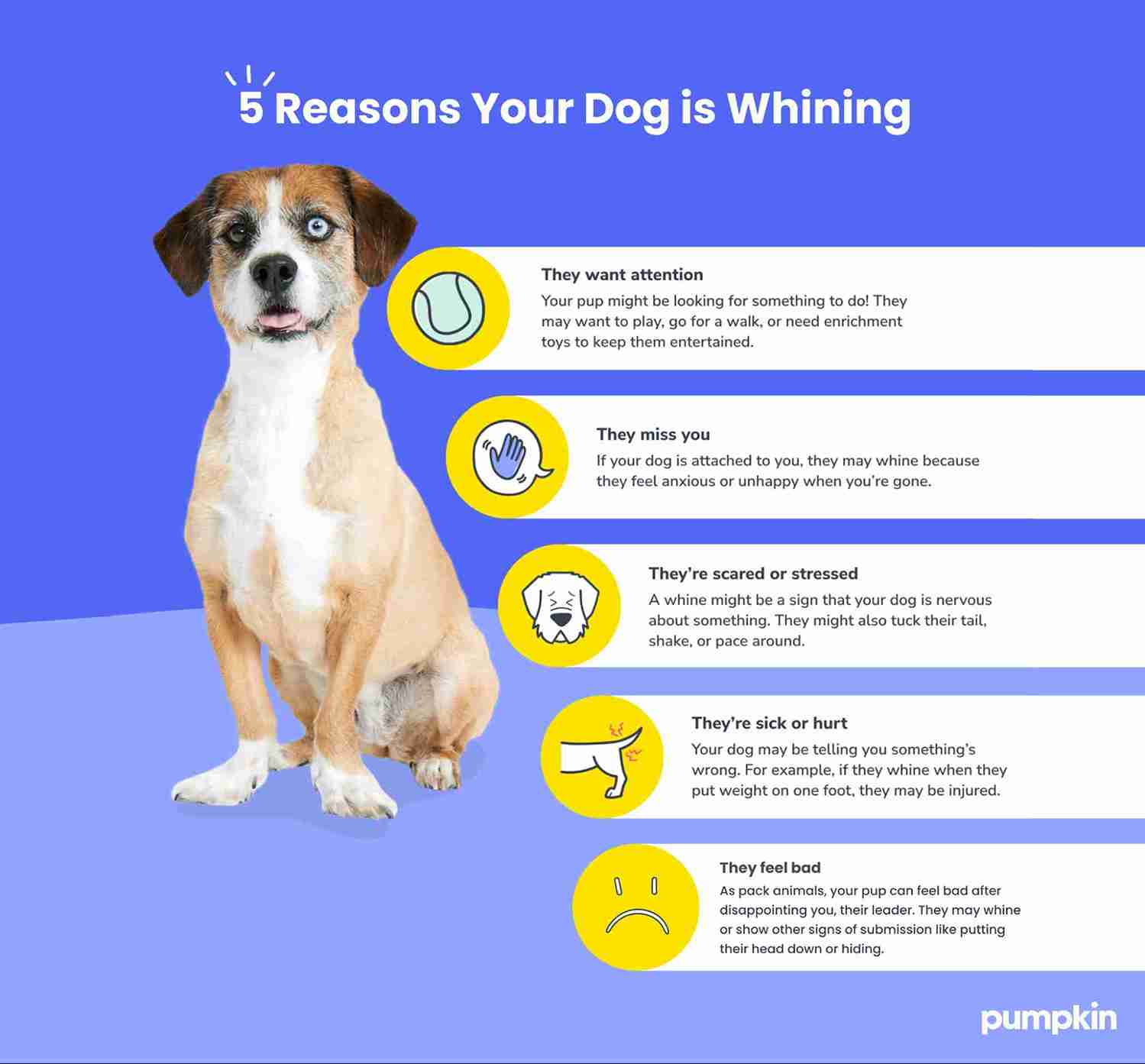Key Points
- Dogs whine for a range of reasons, including anxiety, fear, and illness.
- If your dog is whining to get your attention, you should try to discourage the behavior.
- Make sure your dog gets plenty of mental stimulation and exercise, which can reduce whining.
When your dog cries, it can tug at your heartstrings. No one wants to see their pet unhappy, and this behavior can be hard to ignore. Dogs can’t tell their owners in plain English that something is wrong, so they find other ways to get their point across, such as barking, biting, or in this case, whining.
But what happens when the occasional yelp turns into persistent whining? If this has become a common occurrence, it’s important to find out why. Some dogs whine just to get attention, while others may be scared, sick, or lonely.
Here are a few common reasons your dog may be whining.
1. They want your attention
The most common reason why your dog is whining is that your pup wants your attention. In their younger years, your dog may expect more interaction, similar to how children cry to express their need for their parents’ attention.
Make sure your dog has plenty of playtime and mental stimulation, whether you take them out on frequent walks or provide them with enriching puzzles and toys. If their whining goes unaddressed, they may resort to other canine behavior problems, such as chewing furniture, scratching walls, or having accidents in the house.
During the crate training process, you may need to ignore whining at times so your puppy learns they won’t be rewarded for this behavior. With older dogs, check to make sure there’s nothing physically wrong with them.
What to do if your dog keeps whining for attention
To mediate attention-seeking whining, don’t reinforce the behavior by immediately trying to appease them or showering them with affection. This will encourage them to whine more in the future until you give them what they want. Instead, avoid eye contact or any form of interaction until they stop, and immediately reward them when they become quiet.
Repeat this process to show your dog that whining will not be effective. This will teach them alternative ways to communicate with you and actively discourage them from whining for attention.
2. They’re scared or stressed
If an adult dog is whining while exhibiting other behaviors, such as shaking, panting, or pacing, it may be a sign that they’re stressed. If their ears and tails are tucked, they may feel unsafe and in need of security.
First, identify what is making your dog uncomfortable, whether it’s a person, another animal in close proximity, or a thunderstorm. Then, create some distance between the person/object and your dog until your pet is calm again. When this isn’t possible, stay with your dog and comfort them.
What to do if your dog keeps whining from stress
Lure your pup away from the stress factor with a treat each time they take a few steps back.
Repeat this process until your dog has calmed down. This should help your dog regulate their emotions and slowly learn that the perceived threat is less scary than they thought.

3. They miss you
Another reason why your dog might be whining? Separation anxiety. Separation anxiety occurs when dogs become overly attached to their owners and feel threatened when they leave. Do you notice your dog whining excessively when you prepare to step out of the house? Do they bark or try to stop you from leaving?
When left unchecked, anxious dogs can adopt more harmful behaviors, such as trying to escape their home, peeing or pooping inside, or chewing up furniture. To ensure your dog is both physically and emotionally safe, you must address separation anxiety immediately after noticing symptoms.
Companion dogs such as Cavalier King Charles Spaniels, Golden Retrievers, and Cavapoos can be more prone to separation anxiety than independent breeds. Many pandemic pets also suffered from anxiety when their owners suddenly went back to work. With time and proactive training, you can help them get over their fear of being alone.
What to do if your dog keeps whining from separation anxiety
Before you leave your puppy alone, give them treats or puzzles that will keep them occupied for a long time. You can also get them used to your leaving by starting with short departure times. Then, gradually lengthen them until your dog becomes accustomed to your schedule.
If their separation anxiety is more severe, don’t be afraid to reach out to a certified dog trainer or try dog training classes.
4. They’re sick or hurt
When your dog whines, it could also be because they’re sick or in pain. Be sure to monitor their behavior to rule out any underlying health issues.
Questions to consider include:
- Are they having uncharacteristic potty accidents in the house?
- Are they limping?
- Are they acting strangely lethargic?
- Are they refusing to eat or drink?
- Are they short of breath?
- Are they having difficulty urinating?
- Are they experiencing diarrhea or vomiting?
You should also consider their age. If your older dog yelps every time they jump onto your bed or walks up the stairs, it may be a sign of arthritis. This condition causes joint pain and limits their mobility.
What to do if your dog keeps whining from pain
If you think the whining is pointing to undetected pain or illness, seek veterinary attention.
If your dog is suddenly sick or injured, the cost of vet bills can quickly add up. But when you have a dog insurance plan, you can often be reimbursed for eligible vet bills when facing accidents or illnesses in the future. With a Pumpkin Dog Insurance plan, you can get your dog the care they need without added financial stress.
5. They feel bad
If you just told your dog off for being naughty, whining can be their way of apologizing. Maybe they ate your favorite shoes, ripped the sofa, or had an accident inside.
Dogs are pack animals, and you are the leader, so they may feel bad that they’ve disappointed you. They may also display other submissive forms of body language, such as putting their head down, hiding in a corner, or standing with their tail between their legs.
What to do if your dog keeps whining after discipline
If your pet does start whining shortly after being disciplined, you can accept their apology with a quick pat. Don’t be overly affectionate or reward them because this will send mixed messages.
If your dog is chewing excessively or getting into mischief, make sure you have plenty of toys to keep them busy.
Why is your dog whining?
When your dog is whining, it’s important to find out why. Often, this is a cry for help — or attention, at least. How do you know the difference?
There are often clues attached to this behavior. If your dog wants attention or they miss you, the whining may stop as soon as you throw a ball or give them a cuddle. In this case, rewarding them in this moment can make the behavior worse.
Persistent whining may also be a sign that your dog is ill, in pain, or suffering from anxiety. If this is the case, a visit to your vet should be a priority.




